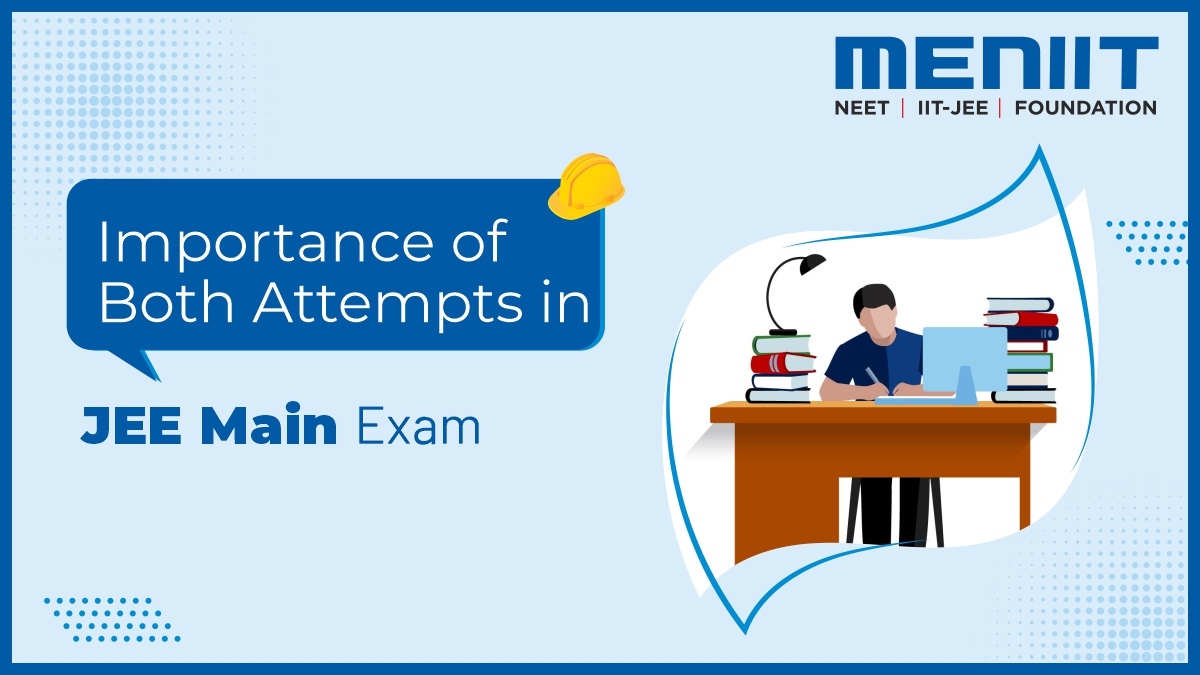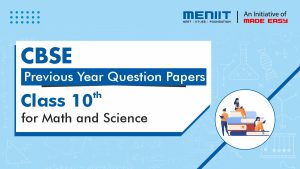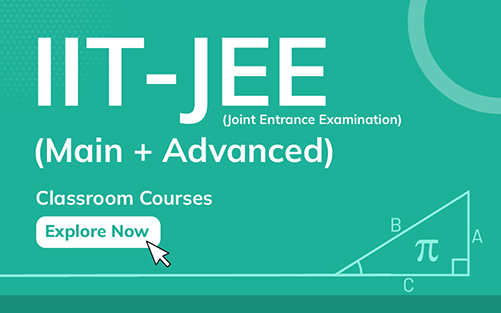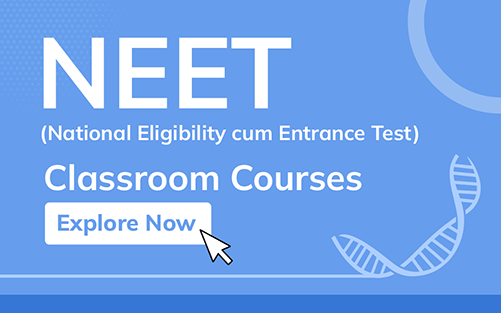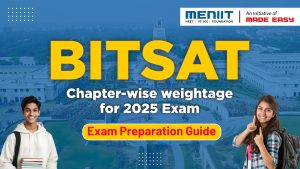Importance of Both Attempts in JEE Main
Are you aiming for JEE Main 2024?
The opportunity to appear multiple times in JEE Main has opened new doors for JEE aspirants, offering them a golden chance to learn, adapt, and improve their scores or ranks.
But you might be confused about the importance of both attempts in the JEE Main. Isn’t it?
In this blog post, we will discuss and understand the importance of both attempts in the JEE Main and the advantages of multiple sessions in the JEE Main. We will discuss how you should approach both attempts.
As we know JEE Main is usually conducted twice a year, in January and April, for admissions in the next academic sessions, and candidates have the option to appear for either one or both attempts.
JEE Main Attempt Limit: There is no attempt limit in JEE Main provided they meet the eligibility criteria to appear for the exam.
It is important to know that appearing in both attempts is not mandatory. Rather, it completely depends on the choice of the candidates.
JEE Main Session 1
JEE Main Session 1 starts in January and fewer candidates appear because of these reasons.
- Board exams
- Procrastination
- Incomplete preparation
- Lack of Guidance
This leads to a slight decrease in the competition as compared to the JEE Main Session 2.
As you step into the arena of JEE Main, it is a test of your fundamental knowledge of Physics, Chemistry, and Mathematics.
Benefits of appearing in the JEE Main Session 1
Appearing for JEE Main Session 1 in January is a win-win situation.
- Fewer candidates appear, so competition is slightly lower.
- All your competitors are fresher like you so, your chances of performing better are high.
- For XII-studying students, it will be advantageous, as at present they are in study flow and will perform well on their first attempt.
- Students can get feedback about their weaknesses and improve them for the next JEE Main attempt.
- If you can secure a good score or percentile in JEE Main Session 1, you can completely focus on the JEE Advanced, which will increase your chances of getting into the Indian Institute of Technology (IIT).
- If you’re not able to perform well in JEE Main Session 1, at least you will know the topics and weak areas you have to work on. You will also become familiar with the types of questions and difficulty level of the JEE Main. It will help you in forthcoming attempts.
Winning Approach for JEE Main Session 1?
- Do not think that you will appear after completing the full preparation.
- Avoid procrastination and always be in active mode to appear for the 1st attempt as your chances of securing a good score on 1st attempt are high as compared to the next session.
- Solve the problems related to JEE Main during board exam preparation.
- Practice JEE Main PYQs before appearing for the JEE Main Session 1.
- Attempt mock tests, analyse your common mistakes, and improve them.
- Seek guidance from expert faculties.
- Join a reputed IIT-JEE coaching institute like MENIIT to prepare for this exam with a result-oriented approach.
JEE Main Session 2
JEE Main Session 2 is conducted in the month of April. Since there is less time gap between session 1 and session 2, if you are aiming for JEE Main Session 2, then you should complete your preparation well in advance.
The majority of aspirants appear in JEE Main Session 2 with the expectation of increasing their percentile. In JEE Main Session 1, aspirants might have missed some exam-relevant topics that they found to be their weaknesses. When they appear for JEE Main Session 2, they appear with full preparation and enthusiasm. This leads to a slight increase in the competition for freshers. While, for repeater candidates, there is a chance of improvement through this attempt. One can secure a good percentile with a well-planned strategy. Let’s discuss what to do before JEE Main Session 2.
Winning approach for JEE Main Session 2?
As repeater students will be appearing with full-fledged preparation in the JEE Main Session 2 exam, fresher candidates may face a gap in preparation and practice than repeaters. So all candidates should appear with good preparation.
- Analyse the JEE Main Session 1 scorecard and find out where you are lagging.
- If you couldn’t score a good percentile in the JEE Main Session 1, you should identify the actual reason behind poor performance.
- What did you find challenging in JEE Main Session 1?
- Make a list of important topics that need more attention and give sufficient time for revision.
- Make short notes and revise all important formulas and equations.
- Must practice and analyse JEE Main PYQs
- Solve mock tests and give time to analyse common mistakes.
- Identify your weaknesses and improve upon the specific areas to score better than JEE Main Session 1.
- Improve problem-solving speed, accuracy and time management skills.
Tips for Dropper: It would be a win-win situation to appear for the JEE Main Session 2 with full-fledged preparation. The chances of securing a good percentile in JEE Main Session 2 are higher compared to JEE Main Session 1 if appears with holistic preparation.
Ultimately, the best score out of the two JEE Main sessions will be taken into consideration for final merit or rank preparation.
What are the benefits of multiple attempts in JEE Main?
- The sole purpose of multiple attempts in JEE Main is that students can identify and learn from their mistakes, analyse and improve them, and appear for the next attempt with good preparation. So utilise your time carefully.
- This will allow the candidates to improve their ranks or scores in the JEE Main if they can not give their best in one attempt.
- In the first attempt, the candidates will get the experience of appearing for a prestigious engineering entrance exam and recognise their common mistakes and weaker areas, which they can improve for the next attempt.
- This will reduce the chances of dropping a year, and candidates will not have to waste a full year.
- If anyone misses the examination due to an unexpected reason (such as the board examination, health issues, or other circumstances), then they will not have to wait for a year to appear again in the JEE Main.
- A candidate need not appear in both sessions of the JEE Main. However, if a candidate appears in more than one session, then the best of the JEE Main scores will be considered for the preparation of the merit list or ranking.
For IIT-JEE aspirants, it is strongly recommended to appear for the first session of the JEE Main and not miss the golden opportunity to stay ahead of the tremendous competition in the next attempt. Attempt with full confidence, and always remember that you are competing with freshers like you, so you just have to perform a little better to score well in the JEE Main.
In this cut-throat competition, one can ace JEE Main with an effective strategy and the right mentorship.
Millions of aspirants appear for the JEE Main but a few aspirants make it just because they prepared with true guidance and have a winning ideology for this exam. This exam is all about completing the syllabus on time and practising a lot of quality questions.
JEE Main demands a deeper understanding of topics and application of fundamental concepts to solve unique problems within a limited time so, it is strongly recommended to prepare under the guidance of experienced faculties.
JEE Main plays a significant role, not just in NITs, but also in getting into IITs. It boosts your confidence to a maximum level that, if you prepare with the right strategy and guidance, can crack JEE Advanced with a good rank.
After carefully examining the essentials of JEE Main, MENIIT is providing personalised guidance to IIT JEE aspirants.
MENIIT is conducting MST (MENIIT Scholarship Test) for meritorious students.
Enroll now to get up to 100% merit-based scholarship.
To know more about the MST (MENIIT Scholarship Test), must read this blog
What are the features and benefits of MST?
Stay calm and confident, and appear with full enthusiasm.
Pro Tips for JEE Main: Learn, Practice, Improve and Achieve.
If you have any questions regarding your JEE preparation, kindly ask your doubts in the comment section; we will be happy to help you.“ Before playing a game, learn the rules of the game. Because to win you have to play better than others”
Frequently Asked Questions (FAQs)
1. Is it compulsory to attempt both sessions of JEE Main?
No, it is not compulsory to appear in both sessions of the JEE Main. It completely depends on the choice of the candidate.
2. How to prepare for JEE Main with 12th board exams?
One can prepare for JEE Main and Class 12th board exams simultaneously with an effective strategy.
Below are a few tips to prepare effectively for JEE Main and board exams:
- Make a realistic timetable.
- Make a list of topics that are common in both exams.
- Allocate sufficient time to cover those topics first.
- Make comprehensive and short notes for quick revision.
- Must solve and analyse Class 12th PYQs.
- Make a realistic schedule for revision and revise regularly.
- Write answers on each topic for board exams.
- Solve Mathematics questions by writing the steps used in solving the numerical problems.
3. What is the difference between Session 1 and Session 2 of JEE Main?
There is no difference in the exam pattern or syllabus for both Session 1 and Session 2. Just that, you get two chances to appear for the JEE Main. The Session 1 Exam is conducted in January, while Session 2 is conducted in April.
4. Can we appear for the JEE Main Session 2 without appearing for the JEE Main Session 1?
Yes, you can appear for any of the sessions of the JEE Main, provided you meet the eligibility criteria. The best scores out of the two sessions will be considered for the preparation of the merit list and admission to the undergraduate programs.
5. What are the benefits of passing the JEE Main exam?
You can get the opportunity to pursue an engineering degree from the prestigious NITs, IIITs, CFITs and top engineering colleges of India. You can explore diverse career opportunities.
6. How can I prepare for JEE Main and JEE Advanced together?
JEE Advanced is more challenging compared to JEE Main in terms of the level of difficulty and types of questions asked. JEE Advanced asks questions that require in-depth knowledge to solve. Generally, concept-based questions are asked in the JEE Advanced. However, the syllabus for the JEE Main and JEE Advanced is almost similar. Some additional advanced topics are included in the JEE Advanced Syllabus.
3 effective tips to prepare for JEE Main and JEE Advanced together:
Analyse the similarities and differences between JEE Main and JEE Advanced.
To know more details about the differences between JEE Main and JEE Advanced. You can read this blog to get a better understanding of JEE Main and JEE Advanced.
Difference between JEE Main and JEE Advanced: Learn about Difficulty levels and Subjects
Make comprehensive notes by highlighting the differences.
Solve and Analyse JEE Main PYQs and JEE Advanced PYQs
Dear Aspirants!
MENIIT is a platform where you can get expert insights and invaluable study tips on IIT-JEE, NEET, and other entrance examinations. Stay ahead of the competition with MENIIT. Ace these exams with our proven strategies, and stay informed about the latest exam updates and precious tips from our experts.
So, hurry up, subscribe to the MENIIT YouTube channel now, and never miss an update on new videos.

